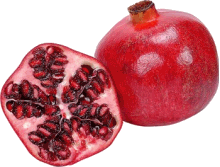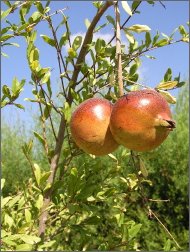The Power of the Pomegranate: The 9 Health Benefits of this Wonder Fruit, and How to Eat Them
by www.SixWise.com
For centuries, pomegranates have been regarded as a treasure
among fruits. In ancient times, the Babylonians would chew
the seeds before battle, believing it would make them invincible.
And the ancient Egyptians were buried with pomegranates.
In modern times, the pomegranate is a popular addition to
Middle Eastern, Indian and Iranian cuisines. In the United
States, this "jewel of winter" as it's sometimes
referred to has become widely marketed as a powerful health
juice in the last couple of years.
|

Only the seeds of this heart-healthy fruit are edible.
|
And increasing numbers of studies are confirming what it
appears many cultures have known for some time: pomegranates
are indeed a wonder fruit. If you don't regularly eat pomegranates
or drink their juice, here are nine reasons why you may want
to start.
1. Rich in Disease-Fighting Antioxidants
Pomegranate juice may contain close to three times the antioxidants
as green tea or red wine. Antioxidants fight against free
radicals -- unstable molecules that can damage DNA and cell
membranes. This cellular damage has been linked to all kinds
of diseases including cancer.
2. Protect Your Heart
A study published in Proceedings of the National Academy of
Sciences found that pomegranate juice combats hardening of
the arteries and related diseases like heart attacks and strokes.
It seems to limit the genetic tendency toward hardening of
the arteries.
"The protective effects of pomegranate juice were higher
than previously assumed," said Claudio Napoli, the study's
author and a professor of medicine and clinical pathology
at the University of Naples, Italy.
Another study in the September 16 issue of the Journal of
Cardiology found that after patients with coronary heart disease
(CHD) drank pomegranate juice every day for three months:
"In conclusion, daily consumption of pomegranate juice
may improve stress-induced myocardial ischemia in patients
who have CHD," researchers said.
3. Fight Osteoarthritis
Pomegranate extract may be useful in fighting osteoarthritis,
according to a study at Case Western Reserve University, published
in The Journal of Nutrition. In lab tests, the extract:
Researchers said their findings "indicate the pomegranate
fruit extract or compounds derived from it may inhibit cartilage
degradation in osteoarthritis and may also be a useful nutritive
supplement for maintaining joint integrity and function."
4. Keep Prostate Cancer From Returning
A study found that pomegranate juice may help fight the return
of prostate cancer among men who have had surgery or radiation
for the disease. In fact, among 48 such men who drank 8 ounces
of pomegranate juice each day until their prostate cancer
progressed:
-
The juice significantly lengthened the time it took for
the men's average PSA levels (a gauge of prostate cancer
progression) to double.
-
None of the men developed cancer that spread beyond the
prostate during the study.
|

It's been suggested that the apple in the biblical
Garden of Eden was actually a pomegranate.
|
"Pomegranate juice contains antioxidant chemicals that
may have cancer-preventing benefits," the researchers
said.
5. Help Lower Bad Cholesterol
Antioxidants in pomegranates have been found to reduce the
oxidation of LDL (bad) cholesterol in mice, according to a
study in the American Journal of Clinical Nutrition.
6. Lower Blood Pressure
A study also found that pomegranates help lower blood pressure
among people with hypertension.
7. Get Your Nutrients
One pomegranate has about 40 percent of the recommended daily
vitamin C requirement for adults, along with folic acid, fiber,
potassium, niacin and vitamins A and E.
8. Protection for Newborns
A study published in Pediatric Research found that drinking
pomegranate juice during pregnancy helped protect newborns'
brains during traumatic births.
9. Fight Breast Cancer
Israeli researchers found that pomegranate seed oil causes
breast cancer cells to self-destruct, while leaving healthy
cells unharmed.
How to Eat (and Enjoy) a Pomegranate
Eating a pomegranate takes some work because the edible seeds
are encased in an inedible white membrane. The seeds are the
part you want to eat -- they have a tangy, sweet-sour flavor
-- or use to make juice, jellies and marinades. Here's the
best way to get to them:
-
Slice the crown end of the pomegranate off.
-
Score the rind in several places around the fruit (from
top to bottom).
-
Break (or cut) the sections apart.
-
Put the sections in a bowl of water.
-
Pry the seeds out with your fingers (be careful, the
juice will stain clothes permanently).
-
Strain the seeds using a colander.
-
The seeds can be eaten right away, stored in the refrigerator
or even frozen.
 Looking
for a special treat? Try this tasty recipe for Pomegranate
Ginger Muffins from the Pomegranate
Council:
Looking
for a special treat? Try this tasty recipe for Pomegranate
Ginger Muffins from the Pomegranate
Council:
Recommended Reading
The
15 Healthiest Berries You Could Possibly Eat ... Including
7 Most Haven't Heard Of
Sweet on Lemons:
Seven Reasons to Give Healthy Lemons a Loving Squeeze
Sources
National
Geographic News
CBS
News September 9, 2005
Nutra
Ingredients September 19, 2005
WebMD
Health
Newswise:
Health Benefits and Pomegranate Juice
Whole
Health MD